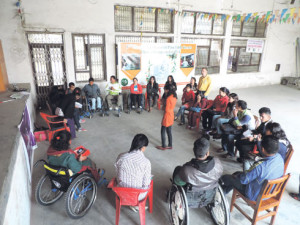Teaching triumphs
PRAMILA RAI
KATHMANDU, March 23: She commands the room as she speaks about changing the perception of the society toward blind and physically handicapped people. Radiating confidence, the slim girl, in her brown jacket and a trendy belt around her waist, is the epitome of positive energy and poise.
Sristi KC doesn’t let the fact that she is blind stop her from setting and achieving goals. It was through the negligence of a doctor that Sristi lost her vision at the age of 16. “I went to the doctor to get treatment because my eyes turned red but I was given the wrong medicine,” she explains. If one commiserates with this incident, she stops them. “I like to believe that I got vision because of this incident.”
Blind Rocks’ one day training, inside the SOS conference hall in the premises of National Orthopedic Hospital, Jorpati, is a precursor to the street plays that she envisions for April. Some of the participants are visually impaired, the others are on wheelchairs and the rest are volunteers from ENGAGE Nepal, who is jointly organizing this training.
In the training, Sristi has incorporated a lot of humor and acceptance regarding their situation. Participants play the role of a teacher, a parent or a sighted person as they relate the common responses from each sector of the society. ‘It costs extra to bring in a trained teacher’, ‘He can’t read. How will we teach him?’, are a teacher’s response. And while a parent might say ‘There’s no need for her to study. Let her stay at home’, a friend could say about the blind classmate ‘He can’t even use the bathroom properly. He will surely not bring his own lunch.’
These responses, while they incite laughter, are painfully true in many parts of the country. As the founder of Blind Rocks, Sristi is probably the best example of overcoming barriers. She has prevailed over similar situations and she says it was a healthy dose of ego that made her stronger than ever and led her to conquer life.
Looking back at her own experience, she urges those in the training session to be strong, interactive and also to participate and contribute as much as possible. “Be an asset,” she tells them.
Bishal Dulal has been visually impaired since the age of three. An undergraduate student of Sociology and Rural Development at Pashupati Multiple Campus, he has plans just like any other young college goer. He uses Facebook in his free time and also participates in rallies.
“This is my first participation at training like this. It’s important for us to intermingle in society so that there’s more awareness about our issues,” he says cheerfully.
One of ENGAGE Nepal’s programs is basketball wheelchair where ENGAGE Corps members are trained to teach the sport to the athletes in wheelchairs. “There are three Corps volunteers in each team,” Corps Coordinator Kusum Lama, says, “We have three teams, in Jorpati, St Xaviers and Padma Kanya Campus. It’s about building team work and encouraging the feeling of oneness with the mainstream society.”
Michael Rosenkrantz from VSO Nepal highlighted the need for physical infrastructure in aid of handicapped people in the country. He has experience of working for the development of disabled people and he elaborates on the requirement for sidewalks, buses and bathrooms to ensure independence and comfort for them.
The banner in the hall stated that the training is ‘on barriers of change’ and ‘extraordinary ends’. Blind Rocks offers trainings on interpersonal skills (which Sristi feels the blind really need), confidence building, and dance and fashion.
The last two lessons are a reminder that they are just like everybody else. “Just because we are blind doesn’t mean we don’t like fun things,” Sristi says. She loves dancing, she says, and it’s also a social skill.
Before she started Blind Rocks in December 2013, she studied Social Entrepreneurship at Kanthari International in Kerela, India. Then she worked as a project coordinator in the institution’s blind school for six months before moving back to Nepal.
She has been very productive, visiting Russia to perform and teach dance to children, and to Surkhet and Bhaktapur for trainings as well as generating awareness.
Awareness is not just for the society. Sristi believes in going that extra mile and in this case, awareness is mostly important for the physically disadvantaged people themselves. Only when they learn to believe in themselves can they really start living a life of dignity and happiness.
Next up is preparing a script for the street play and then visiting Rasuwa and Pokhara to continue the awareness and empowerment programs.
Courtesy:My Republica
Comments
Tell me what you're thinking...
and oh, if you want a pic to show with your comment, go get a gravatar!

